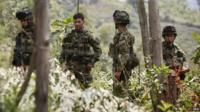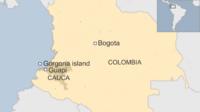Farc suspends truce after Colombia army attack
- 23 May 2015
- Latin America & Caribbean

Colombia's Farc leftist rebel group has suspended a unilateral ceasefire after 26 of its fighters were killed in a government air and ground offensive.
The ceasefire had been in place since December 2014.
Farc said it wanted a full bilateral truce but stressed it was not abandoning the long-running peace talks taking place in Havana.
Meanwhile President Juan Manuel Santos has called on the rebels to "speed up" the negotiations.
The two sides have been in on-off negotiations since 2012 in an attempt to end more than half a century of conflict.
Thursday's attack - in the country's south-western Cauca region - was the deadliest since the resumption of air strikes against the rebels last month.
The guerrilla group said in a statement that the ceasefire suspension was the result of "five months of land and air offensives against our structures all over the country".
"We deplore the joint attack by the air force, the army and the police," said the statement.
"We feel pain for the deaths of guerrilla fighters as well as soldiers, sons of a same people and from poor families".
But the group said they were willing to continue with the latest round of peace talks in Havana.
"Against our will we will proceed with the [peace] talks in the middle of a confrontation," they said.
They also reiterated their demand for Mr Santos to agree a bilateral ceasefire.

Analysis: Natalio Cosoy, BBC Colombia Correspondent
The peace talks in Havana between Colombia's government and Farc rebels were shaken in November when the rebels captured a high-ranking army general, who was later released.
They were shaken again in April when the rebel group ambushed an army unit and killed 11 of its men.
Now another flaring of violence will pile even more pressure on the men and women sitting around a table in the Cuban capital.
The decision by the Farc to suspend its ceasefire seems to suggest an intensification of Colombia's half-century-long internal conflict. More attacks by the group are expected, as well as new government offensives.
But both the government and the rebel group insisted in the wake of this latest confrontation that they will not abandon the negotiations in Havana.
Moreover, some analysts in Colombia believe that this apparent setback could in fact be the first step towards a bilateral ceasefire.

Mr Santos, who restarted air strikes against the rebels last month after 11 soldiers were killed in an ambush, addressed the rebels via his Twitter account.
He wrote: "Gentlemen of the Farc: now is the time to speed up the negotiations. How many more deaths do we need to understand that we have arrived at the time for peace!" he wrote.
Thursday's military action comprised an air strike and ground assault against the rebel group in Guapi, Cauca, said officials.

The operation's aim was the capture of a rebel known by the alias "Javier", and two rebels were captured along with those killed, defence ministry officials told the Efe news agency.
At the previous round of peace talks, the Farc called for the dismantling of right-wing paramilitary groups fighting against the rebels.
The two sides failed to reach an agreement over reparations for the victims of the conflict, an issue that has been wrangled over for months.

The peace process
November 2012 - Formal peace talks begin in the Cuban capital Havana between the Colombian government and the Farc.
May 2013 - A deal is reached on land reform, one of the most contentious issues. It calls for fair access to land, and rural development, two key causes of the conflict.
November 2013 - The two sides agree on the political participation of the Farc should a peace deal be reached.
May 2014 - Both parties pledge to eliminate all illicit drug production in Colombia.
December 2014 - Farc declares a unilateral ceasefire.
March 2015 - Both sides agree to work together to remove landmines. Colombia is one of the most heavily mined countries in the world.
April 2015 Government resumes air strikes after the Farc kills 11 soldiers in ambush.
May 2015 Farc suspends its unilateral ceasefire after government military operation kills 26 rebel fighters.
No comments:
Post a Comment
Please leave a comment-- or suggestions, particularly of topics and places you'd like to see covered